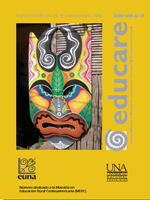El abuso sexual a niñas, niños y adolescentes: un secreto familiar, un problema familiar, un problema social
DOI:
https://doi.org/10.15359/ree.12-Ext.9Keywords:
Sexual abuse, law, rural communitiesAbstract
This investigation has the purpose of identifying how to prevent through educational processes, and then eradicate, the sexual abuse against children and adolescents in rural communities from Salvador, Guatemala, Honduras and Nicaragua.
The premise is that sexual abuse cannot be approached in an isolated way; it requires integral and committed actions of the institutions in charge of children and adolescents’ integral protection and development.
This implies considering: the legal framework, the response offered by government and private organizations towards the prevention and attention of rights as well as their actions to penalize and restore the violated rights; the role of families as main responsible of the well being of their children and the role of children and adolescents.
References
Azpuru, D. (2007). Cultura Política de la Democracia en Guatemala: 2006. Guatemala: Vanderbilt,
University.
Córdova, R., Cruz, J. M., Seligson, M. A. (2007). Cultura Política de la Democracia en El Salvador:
San Salvador, El Salvador: Vanderbilt, University.
Cruz, J. M., Argueta, J. R., Seligson, M. A. (2007). Cultura Política de la Democracia en Honduras:
Honduras: Vanderbilt, University.
Fondo de las Naciones Unidas para la Infancia [UNICEF]. (1989). Convención sobre los Derechos
de la Niñez. Ginegra, Suiza: Oficina de Alto Comisionado.
República de El Salvador [Leyes y Decretos]. (1993). Código de la Familia de El Salvador. San
Salvador, El Salvador.
República de Guatemala [Leyes y Decretos]. (1973). Código Penal de Guatemala. Guatemala.
Guatemala.
República de Guatemala [Leyes y Decretos]. (2003). Ley de Protección Integral de la Niñez y
Adolescencia de Guatemala. Guatemala.
República de Honduras [Leyes y Decretos]. (1996). Código Código de la Niñez y Adolescencia de
Honduras, y reformas. Honduras.
República de Nicaragua [Leyes y Decretos]. (1998). Código de la Niñez y Adolescencia de
Nicaragua. Asamblea Nacional: Managua, Nicaragua.
Serra, L., López, P., Seligson, M. A. (2005). Cultura Política de la Democracia en Nicaragua, 2004.
Nicaragua: Vanderbilt, University.
Downloads
Published
How to Cite
Issue
Section
License
1. In case the submitted paper is accepted for publication, the author(s) FREELY, COSTLESS, EXCLUSIVELY AND FOR AN INDEFINITE TERM transfer copyrights and patrimonial rights to Universidad Nacional (UNA, Costa Rica). For more details check the Originality Statement and Copyright Transfer Agreement
2. REUTILIZATION RIGHTS: UNA authorizes authors to use, for any purpose (among them selfarchiving or autoarchiving) and to publish in the Internet in any electronic site, the paper´'s final version, both approved and published (post print), as long as it is done with a non commercial purpose, does not generate derivates without previous consentment and recognizes both publisher's name and authorship.
3. The submission and possible publication of the paper in the Educare Electronic Journal is ruled by the Journal’s editorial policies, the institutional rules of Universidad Nacional and the laws of the Republic of Costa Rica. Additionally, any possible difference of opinion or future dispute shall be settled in accordance with the mechanisms of Alternative Dispute Resolution and the Costa Rican Jurisdiction.
4. In all cases, it is understood that the opinions issued are those of the authors and do not necessarily reflect the position and opinion of Educare, CIDE or Universidad Nacional, Costa Rica. It is also understood that, in the exercise of academic freedom, the authors have carried out a rogorous scientific-academic process of research, reflection and argumentation thar lays within the thematic scope of interest of the Journal.
5. The papers published by Educare Electronic Journal use a Creative Commons License:














 The articles published by Educare Electronic Journal can be shared with a Creative Commons License:
The articles published by Educare Electronic Journal can be shared with a Creative Commons License: 



